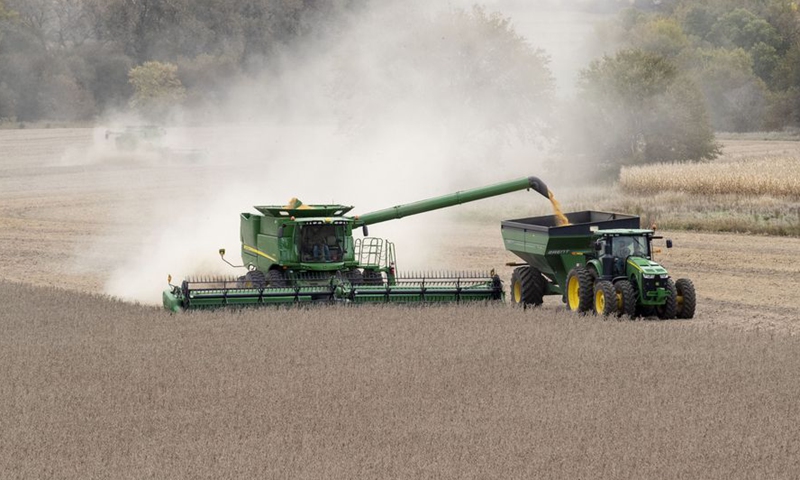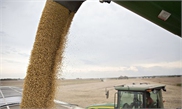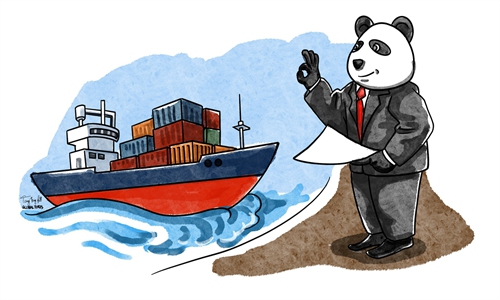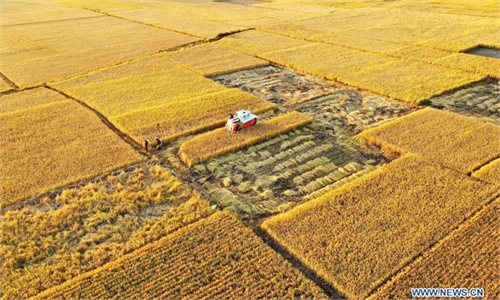COMMENTS / EXPERT ASSESSMENT
‘Soy stability plan’ not to impact beans imports in 2021

Photo: Xinhua
China has recently announced a plan to secure self-sufficiency in soy production and edible soybeans by increasing acreage throughout 2021 as part of a comprehensive plan to ensure food security.The country will continue implementing the plan to rejuvenate soybean farming, strive to maintain the soybean acreage above 9 million hectares, improve yield and quality, and ensure self-sufficiency in soy products and edible soybeans, Tang Renjian, Minister of Agriculture and Rural Affairs said in a recent interview with Xinhua.
The "soy stability plan" is likely to substitute a proportion of soybean imports, but will have no significant impact in the current year. Despite increasing domestic soybean acreage, China's imports are expected to remain at an elevated level in 2021, given robust economic recovery and rising consumer demands.
The core aim of the newly inducted policy is to ensure food security - to secure domestic supply of edible soybeans and not to overly rely on exports. But, in fact, edible soybeans merely account for a small part of overall domestic consumption. A majority of the domestic soybean consumption is directed to food oil and livestock feed. Therefore, to increase domestic soybean acreage will only substitute part of edible beans imports, but not to have impact on the major part of total soybean imports.
As the income levels grown boosted by a strong economy, in post-pandemic era, demand for meat is expected to grow, which will in turn ratchet up the demand for soybean imports. China's soybean imports has seen sharp surge in 2020, hitting a record high of over 100 million tons, according to media reports.
The impact of the African Swine Fever (ASF) lead to a restructuring of the domestic pork production industry. The surging demand for poultry meat, beef and lamp has caused a shift in animal feed consumption. As the consumption structure is expected to return this year, the demand for soybean will keep rising.
The US trade war has pushed China to diversify soybean importing source countries. While major agricultural production countries have increased soybean acreage, China has chosen more cost efficient options. After the US started the trade war against China, the tariff measures imposed by the US has caused Brazil, Argentina and some east European countries to increase soybean acreage and expand exports to China.
As China followed through on the implementation of the phase one trade deal with the US, Chinese businesses have largely increased agricultural products imports from the US. A series of factors has meant soybean imports surged in 2020. Despite the ongoing pandemic, China's soybean demand is expected to remain elevated.
China has continued down the path of opening up and reform, proactively rolling out and implementing measures to expand imports. During the 13th Five-Year Plan period, China has cut import tariffs on agricultural products on the basis of 15.2 percent at the beginning of joining the WTO, becoming one of the most open agricultural markets in the world.
Meanwhile, agricultural trade situation has been strategically optimized. China has formed much closer ties with major trade partners. Based on the precondition of securing domestic food security and agricultural industry security, China relaxed restrictions on foreign investments in agricultural sectors.
To accelerate exports, China has been reducing tariffs on agricultural products. The signature of the Regional Comprehensive Economic Partnership and the completion of China-EU Comprehensive Agreement on Investment will largely reduce tariff and investment barriers on agricultural products. The China International Import Expo will also promote the imports of agricultural products, including soybeans.
The author is a professor and head of the Economics and Trade Department with the College of Economics and Management at China Agricultural University. bizopinion@globaltimes.com.cn



